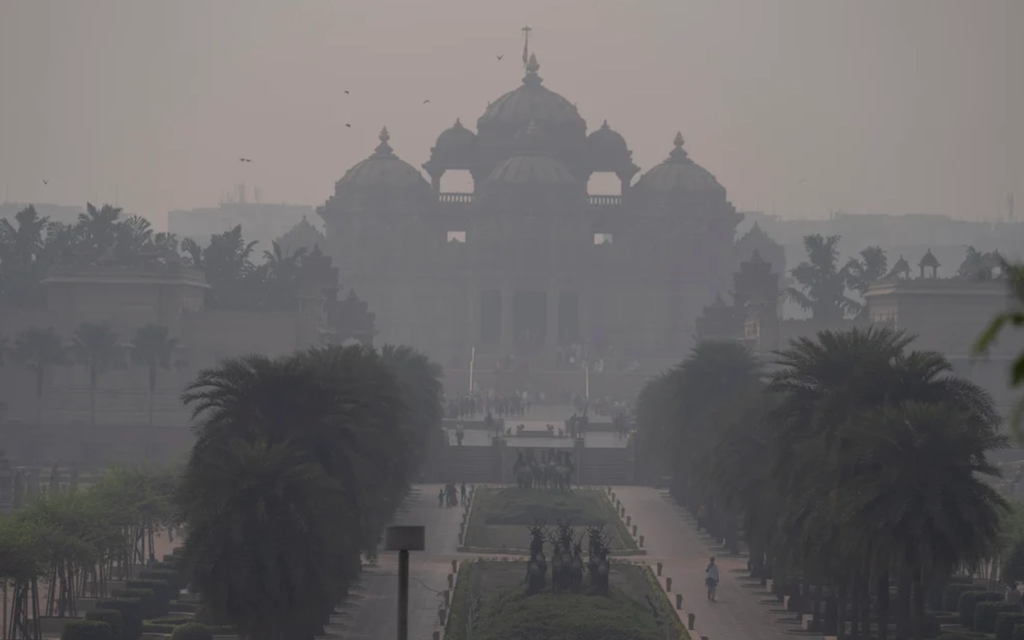New Delhi — The U.S. government will stop sharing air quality data collected at its embassies and consulates. Scientists and local experts say the effort was vital to monitoring air quality around the world and improving public health, but now it might pose big risks if the data for air quality is not available.
In response to a question from The Associated Press, the State Department said Wednesday that its air quality monitoring program will no longer transmit air pollution data from embassies and consulates to the Environmental Protection Agency’s AirNow app and other platforms, which allowed residents of several countries, along with scientists around the world, to view and analyze air quality in cities around the world.
The disruption in data sharing was due “to funding constraints that have caused the Department to shut down the underlying network,” the statement said, adding that embassies and consulates had been instructed to keep their monitors running and that data sharing could resume in the future if funding was restored.
The tax cut, first reported by The New York Times, is one of many under President Donald Trump, whose administration has been deprioritizing environmental and climate initiatives.
U.S. air quality monitors measured dangerous fine particles, known as PM2.5, which can penetrate deep into the lungs and cause respiratory illness, heart disease and premature death. The World Health Organization estimates air pollution kills about 7 million people a year.
News of the data-sharing shutdown sparked an immediate backlash from scientists, who said the data was reliable, allowed them to monitor air quality around the world and helped push governments to clean up the air.

‘A major blow’ to global air quality research
Bhargav Krishna, an air pollution expert at the New Delhi-based Sustainable Futures Collaborative, called the data loss a “major blow” to air quality research.
“They were part of a handful of sensors in many developing countries and served as a baseline for understanding what air quality was like,” Krishna said. “They were also seen as a well-calibrated and unbiased data source to cross-check with local data if there were concerns about quality.”
“It’s a real shame,” said Alejandro Piracoca Mayorga, an independent air quality consultant based in Bogotá, Colombia. U.S. embassies and consulates in Lima, Peru; Sao Paulo and Bogotá have all relied on public air monitoring. “It was a source of access to air quality information independent of local monitoring networks. It provided another source of information to compare.”
Pakistan-based environmental expert and advocate Khalid Khan agreed, saying the closure of air quality monitors “will have significant consequences.”
Khan said the monitors in Peshawar, Pakistan, one of the world’s most polluted cities, “provided crucial real-time data” that helped policymakers, researchers and citizens make decisions about their health.
“Its removal creates a critical gap in environmental monitoring, leaving residents without accurate information about hazardous air conditions,” Khan said. He said vulnerable people in Pakistan and around the world are particularly at risk, as they are least able to access other reliable data.

In Africa, the program provided air quality data for more than a dozen countries, including Senegal, Nigeria, Chad and Madagascar. Some of those countries rely almost entirely on U.S. monitoring systems for their air quality data.
The WHO’s air quality database will also be affected by the closure of the US programme. Many poor countries do not monitor air quality because stations are too expensive and complex to maintain, meaning they rely entirely on monitoring data from US embassies.
Monitors reinforced local efforts
In some places, U.S. air quality monitors prompted countries to start their own air quality research and raised awareness, Krishna said.
In China, for example, data from the US embassy in Beijing contradicted official government reports, showing levels of pollution worse than those acknowledged by authorities. This led China to improve air quality.
Authorities in Pakistan’s eastern Punjab province, which is battling smog, said they were not affected by the removal of the US monitors. Environment Secretary Raja Jahangir said Punjab authorities have their own and plan to buy 30 more.
Shweta Narayan, campaigner for the Global Alliance for Climate and Health, said the closure of the monitors in India was a “huge setback” but also a “crucial opportunity” for the Indian government to step up and fill the gaps.
“By strengthening its own air quality monitoring infrastructure, ensuring data transparency and building public trust in air quality information, India can set a benchmark in environmental governance and accountability,” Narayan said.





